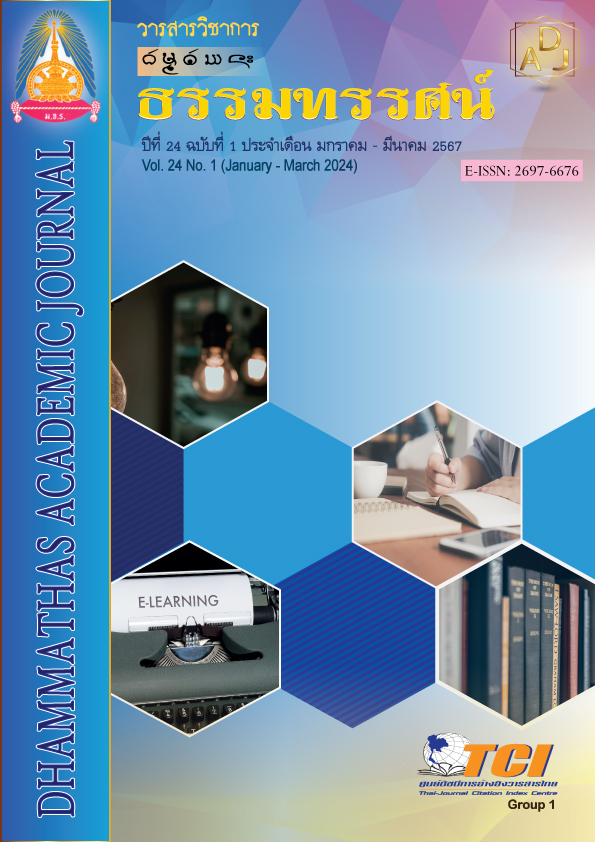Rights and Liberties Protection of Accused and Defendant Buddhist Monk in Criminal Case
Main Article Content
Abstract
This research aims were; 1) to study the problem state and the impact of right and freedom of the Buddhist monks who are an accused or defendant in a criminal case, 2) to study the opinions of protecting the right and liberties of Buddhist monks who are accused or defendant in a criminal case, and 3) to determine guidelines for amending the laws on the protection of rights and liberties of Buddhist monks who are accused or defendant in a criminal case. It is qualitative research. The tool for this research was the In-Depth Interview form. The researcher interviewed the key informants i.e. academic Buddhist monks, monks who were accused or defendants in criminal cases, lawyers, criminologists and penologists, judge, prosecutor, policeman, human right activist and Buddhist people total 31 persons. The key informants were obtained by purposive selection. Data analysis by descriptive method.
The results of study showed that:
1. Problem’s state and the impact on the protection of the rights and liberties of monks who were forced to leave the monkhood before the court’s judgement. It was a deprivation of rights and liberties of monks. Arrest, search, detention, investigation, temporary release and the trial must be conducted properly because it effects the reputation and faith of the people.
2. The views on the protection of rights and liberties of monks who were accused or defendants in criminal cases. There were two statuses of monks: 1) Being citizen of a state subject to the law 2) Position of a monk in Buddhism must follow the discipline and rules of the Sangha. Therefore, they are presumed to be innocent until the final judgment of the offender is obtained, to respect human dignity.
3. Guidelines for amending the law on the protection of rights and liberties of monks resulting from the enforcement the Sangha Act 1962, section 29, 30, repealing or amending unfair laws, enacting a new law on criminal procedure for monks. There should be associate judges from the Sangha to participate in deciding cases in order to truly protect the rights and liberties.
Article Details

This work is licensed under a Creative Commons Attribution-NonCommercial-NoDerivatives 4.0 International License.
เพื่อให้เป็นไปตามกฎหมายลิขสิทธิ์ ผู้นิพนธ์ทุกท่านต้องลงลายมือชื่อในแบบฟอร์มใบมอบลิขสิทธิ์บทความ ให้แก่วารสารฯ พร้อมกับบทความต้นฉบับที่ได้แก้ไขครั้งสุดท้าย นอกจากนี้ ผู้นิพนธ์ทุกท่านต้องยืนยันว่าบทความ ต้นฉบับที่ส่งมาตีพิมพ์นั้น ได้ส่งมาตีพิมพ์เฉพาะในวารสาร วิชาการธรรม ทรรศน์ เพียงแห่งเดียวเท่านั้น หากมีการใช้ ภาพหรือตารางของผู้นิพนธ์อื่นที่ปรากฏในสิ่งตีพิมพ์อื่นมาแล้ว ผู้นิพนธ์ต้องขออนุญาตเจ้าของลิขสิทธิ์ก่อน พร้อมทั้ง แสดงหนังสือที่ได้รับการยินยอมต่อบรรณาธิการ ก่อนที่บทความจะได้รับการตีพิมพ์References
ณัฐธิดา ใจเย็น. (2558). ความเหมาะสมของมาตรการทางกฎหมายอาญาที่ใช้บังคับแก่ภิกษุในการกระทำความผิดเกี่ยวกับทรัพย์ ศึกษาเฉพาะกรณีลักทรัพย์ ยอกยอก ฉ้อโกง. (วิทยานิพนธ์นิติศาสตรมหาบัณฑิต). กรุงเทพฯ: มหาวิทยาลัยธรรมศาสตร์.
มหามกุฎราชวิทยาลัย. (2525). พระไตรปิฎกและอรรถกถาแปล ภาษาไทย ฉบับมหามกุฎราชวิทยาลัย 91 เล่ม. นครปฐม: มหามกุฎราชวิทยาลัย.
มหาวิทยาลัยมหาจุฬาลงกรณราชวิทยาลัย. (2558). พระพุทธศาสนาในประเทศไทยสมัยปัจจุบัน. เข้าถึงได้จาก https://www.mcu.ac.th/article/detail/14270
แม่ชีกฤษณา รักษาโฉม. (2545). การศึกษาเชิงวิเคราะห์บทบาทของพระวินัยธรในพระวินัยปิฎก ศึกษาเฉพาะกรณี พระอุบาลีเถระ และพระปฏาจาราเถรี. (วิทยานิพนธ์พุทธศาสตรมหาบัณฑิต). พระนครศรีอยุธยา: มหาวิทยาลัยมหาจุฬาลงกรณราชวิทยาลัย.
ราชบัณฑิตยสถาน. (2554). พจนานุกรมฉบับราชบัณฑิตยสถาน. กรุงเทพฯ: ราชบัณฑิตยสถาน.
เริงศักดิ์ วิริยะชัยวงศ์. (2561). ศาลอาญาคดีทุจริตและประพฤติมิชอบกับการแก้ปัญหาคอร์รัปชัน. รัฏฐาภิรักษ์, 60(1), 30-31.
วัน สุวรรณพงษ์. (2559). แนวทางการบัญญัติข้อกฎหมายเพื่อคุ้มครองพระพุทธศาสนา. (ดุษฎีนิพนธ์พุทธศาสตรดุษฎีบัณฑิต). พระนครศรีอยุธยา: มหาวิทยาลัยมหาจุฬาลงกรณราชวิทยาลัย.
วินัย พงศ์ศรีเพียร. (2547). กฎหมายตราสามดวง: แว่นส่องสังคมไทย ผลงานวิจัยฉบับสมบูรณ์ ลำดับที่ 1 สถานภาพการศึกษากฎหมายตราสามดวง. กรุงเทพฯ: เฟื่องฟ้า.
สถาบันพระปกเกล้า. (2556). เอกสารประกอบการประชุมวิชาการสถาบันพระปกเกล้า ครั้งที่ 15 ประจำปี 2556. กรุงเทพฯ: ธรรมราชา ส เจริญการพิมพ์.
สมเด็จพระพุทธโฆษาจารย์ (ป.อ.ปยุตโต). (2561). พจนานุกรมพุทธศาสตร์ ฉบับประมวลศัพท์. (พิมพ์ครั้งที่ 32). กรุงเทพฯ: ม.ป.ท.
สำนักงานศาลยุติธรรม. (2559). คู่มือปฏิบัติราชการของตุลาการ ส่วนวิธีพิจารณาความอาญา. กรุงเทพฯ: ชวนพิมพ์.
สิทธิชัย ลีลาโสภิต. (2552). วิเคราะห์หลักพุทธธรรมสำหรับการปฏิบัติหน้าที่ของผู้พิพากษาสถาบันตุลาการศาลยุติธรรมไทย. (วิทยานิพนธ์พุทธศาสตรมหาบัณฑิต). พระนครศรีอยุธยา: มหาวิทยาลัยมหาจุฬาลงกรณราชวิทยาลัย.

